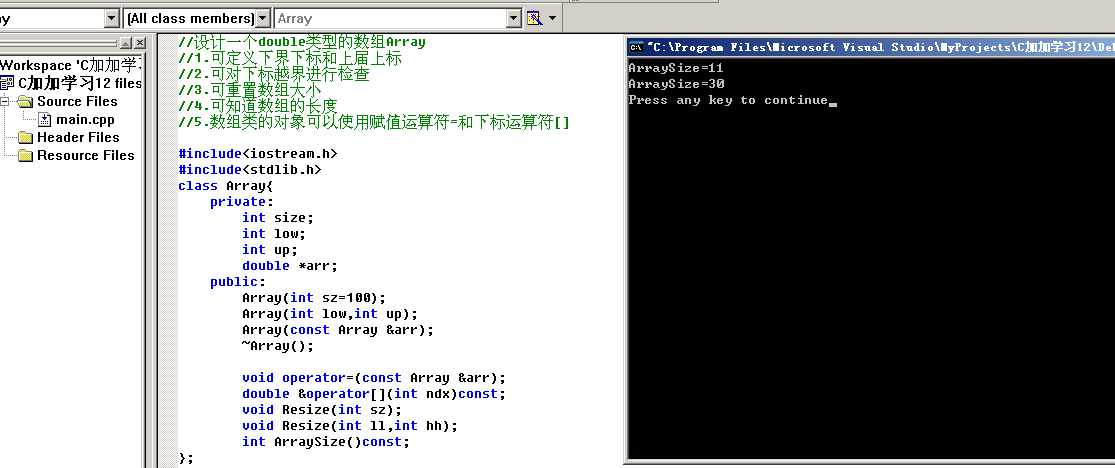1 //设计一个double类型的数组Array 2 //1.可定义下界下标和上届上标 3 //2.可对下标越界进行检查 4 //3.可重置数组大小 5 //4.可知道数组的长度 6 //5.数组类的对象可以使用赋值运算符=和下标运算符[] 7 8 #include<iostream.h> 9 #include<stdlib.h> 10 class Array{ 11 private: 12 int size; 13 int low; 14 int up; 15 double *arr; 16 public: 17 Array(int sz=100); 18 Array(int low,int up); 19 Array(const Array &arr); 20 ~Array(); 21 22 void operator=(const Array &arr); 23 double &operator[](int ndx)const; 24 void Resize(int sz); 25 void Resize(int ll,int hh); 26 int ArraySize()const; 27 }; 28 29 Array::Array(int sz){ 30 if(sz<=0){ 31 exit(0); 32 } 33 34 low=0; 35 up=sz-1; 36 size=sz; 37 arr=new double[size]; 38 } 39 40 Array::Array(int low,int up){ 41 this->low=low; 42 this->up=up; 43 size=up-low+1; 44 arr=new double[size]; 45 } 46 47 Array::Array(const Array &arr){ 48 int n=arr.size; 49 size=n; 50 this->arr=new double[size]; 51 52 double *sourcePtr=arr.arr; 53 double *destPtr=this->arr; 54 while(n--){ 55 *destPtr++=*sourcePtr++; 56 } 57 } 58 59 Array::~Array(){ 60 delete []this->arr; 61 } 62 63 void Array::operator=(const Array &arr){ 64 if(&arr==(this)){//如果是自己等于自己,那么返回空 65 return; 66 } 67 68 int n=arr.size; 69 size=n; 70 this->arr=new double[size]; 71 72 double *sourcePtr=arr.arr; 73 double *destPtr=this->arr; 74 while(n--){ 75 *destPtr++=*sourcePtr++; 76 } 77 } 78 79 double &Array::operator[](int ndx)const{ 80 if((ndx<low) || (ndx>size-1) ){ 81 cout<<"数组下标越界"<<endl; 82 exit(0); 83 } 84 return this->arr[ndx-low]; 85 } 86 87 88 void Array::Resize(int sz){ 89 if(sz<0){ 90 exit(0); 91 } 92 if(sz==this->size){ 93 return; 94 } 95 96 double *newArray=new double[size]; 97 int n=(sz<=size)?sz:size; 98 double *sourcePtr=arr; 99 double *destPtr=newArray; 100 while(n--){ 101 *destPtr++ = *sourcePtr++; 102 } 103 delete []this->arr; 104 105 this->arr=newArray; 106 this->size=sz; 107 this->low=0; 108 this->up=size-1; 109 } 110 111 112 void Array::Resize(int ll,int hh){ 113 int sz=hh-ll+1; 114 double *newArray=new double[sz]; 115 116 int n=(sz<=this->size)?sz:size; 117 double *sourcePtr=this->arr; 118 double *destPtr=newArray; 119 120 while(n--){ 121 *destPtr++=*sourcePtr++; 122 } 123 124 delete []this->arr; 125 this->arr=newArray; 126 this->size=sz; 127 this->low=ll; 128 this->up=hh; 129 } 130 131 int Array::ArraySize()const{ 132 return this->size; 133 } 134 135 int main(){ 136 Array a(-5,5); 137 cout<<"ArraySize="<<a.ArraySize()<<endl; 138 for(int i=-5;i<5;i++){ 139 a[i]=i; 140 } 141 142 a.Resize(30); 143 a[21]=21; 144 cout<<"ArraySize="<<a.ArraySize()<<endl; 145 146 return 0; 147 }
